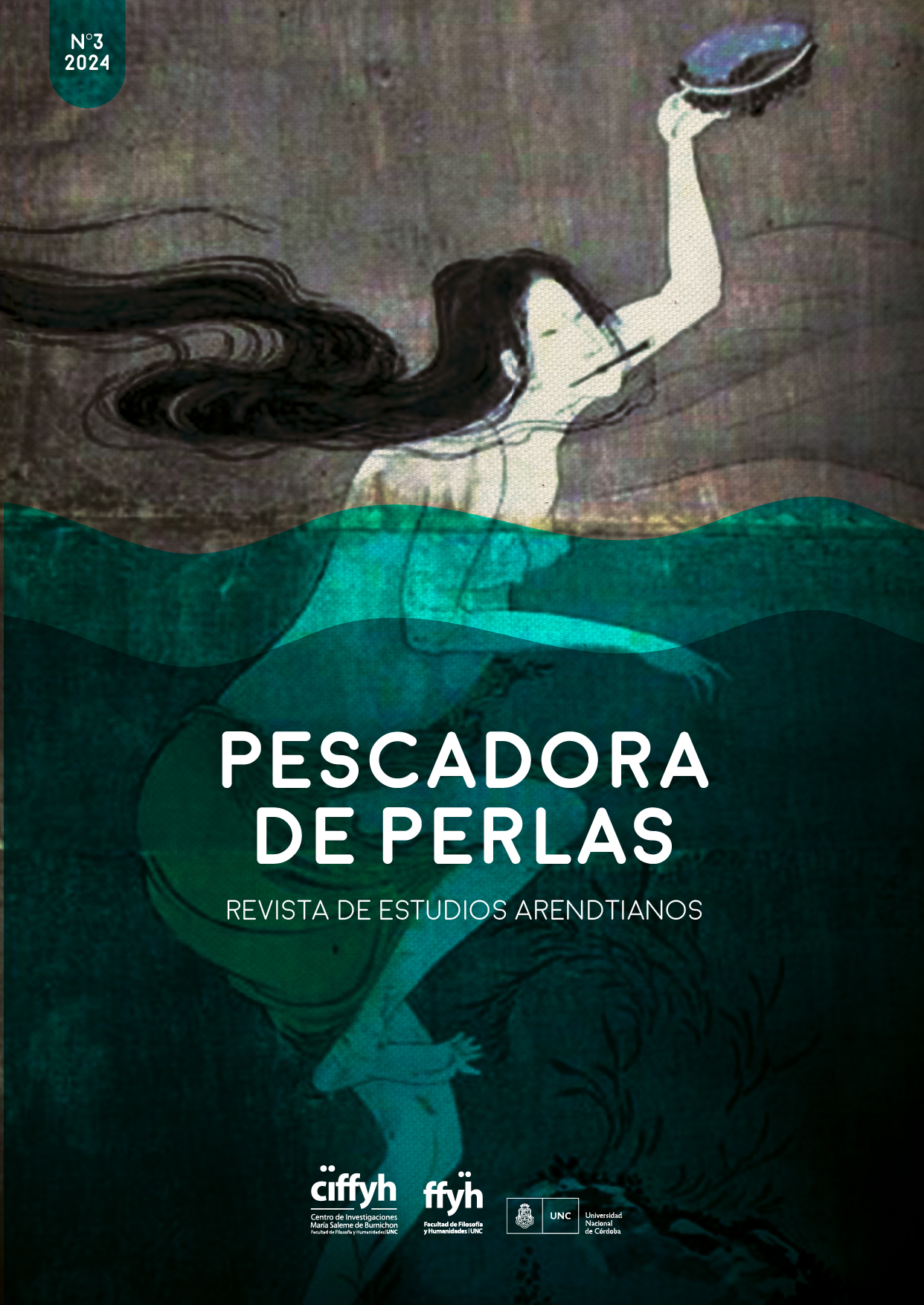Feminism and Hannah Arendt: a coasting voyage
Keywords:
Occult Tradition, Women's Philosophical Thought, Feminist Theory, Political FreedomAbstract
Based on the experience of the work of the Seminari "Filosofia i Gènere" of the University of Barcelona to carry out research on the work of women philosophers, this article shows how the reading of Arendt provides useful heuristic tools to approach the history of feminine thought, as well as illuminating the path that feminist theory has taken to re-signify political freedom and feminine subjectivity. The article is divided into four parts: In the first, "A hidden tradition?", Arendt's notion is used as a way of addressing the relations between women philosophers born on the threshold of the twentieth century. The second and the "insurrectional feminism" of the 1970s and the last quarter of the 20th century provide a useful conceptual network for locating women's political freedom and for distinguishing between liberation and freedom and between equality and homogeneity. Finally, "Arendt and the Ambiguities of Female Emancipation" briefly looks at Arendt's relationship to the feminist movement of her time and highlights how later feminism has paradoxically been one of the driving forces behind the re-reading of her political theory.
References
Arendt, H. y Jaspers, K. (1985). Briefwechsel 1926-1969. Piper.
Arendt, H. (2002). La vida del espíritu. Paidós.
Arendt, H. (2004). La tradición oculta. Paidós.
Arendt, H. (2005). Ensayos de comprensión 1930-1954. Caparrós.
Arendt, H. (2014). Sobre la revolución. Alianza.
Arendt, H. (2018a). Los orígenes del totalitarismo. Madrid.
Arendt, H. (2018b). Entre el pasado y el futuro. Ocho ejercicios sobre la reflexión política. Austral.
Benhabib, S. (1996). The reluctant modernism of Hannah Arendt. Thousand Oaks (CA).
Bird, D. (6 de diciembre de 1975). Hannah Arendt, Political Scientist Dead. New York Times, p. 32.
Birulés, F. (2016). Entreactos. En torno a la política, el feminismo y el pensamiento. Katz.
Bloom, H. (2009). La angustia de la influencia. Una teoría de la poesía. Trotta.
Cavarero, A. (1997). Tu che mi guardi, tu che mi racconti. Filosofia della narrazione. Feltrinelli.
Collin, F. (1971). Maurice Blanchot et la question de l’écriture. Gallimard.
Collin, F. (1999). L'homme est-il devenu superflu ? Hannah Arendt. Odile Jacob.
Collin, F. (2006). Praxis de la diferencia. Liberación y libertad. Icaria.
Char, R. (2005). Hojas de Hipnos. En Poesía esencial. Galaxia Gutenberg.
Di Pego, A. (2022). Diálogos (im)posibles entre Hannah Arendt y los feminismos. En R. Ribeiro Alves Neto (Ed.) Por que ler Hannah Arendt hoje?. Via Verita.
Dietz, M. (1991). Hannah Arendt and Feminist Politics. En S. Hinchman, & L. Hinchman (Eds.), Hannah Arendt: Critical Essays SUNY Press.
Disch, L. J. (1994). Hannah Arendt and the Limits of Philosophy. Cornell University Press.
Diotima (1996). La sapienza di partire da sé. Liguori ed.
Dominijanni, I. (2014). Il trucco. Sessualità e biopolitica nella fine di Berlusconi. Ediesse.
Elshtain, J. B. (1981). Public Man, Private Woman: Women in Social and Political Thought. Princenton University Press.
Esposito, R. (2003). Communitas. Origen destino de la comunidad. Amorrortu.
Fraisse, G. (2002). Entre igualdad y libertad. En La controversia de los sexos. Minerva Ediciones.
Guerra Palmero, M. J. (2011). Arendt y los feminismos contemporáneos: ontología y política. Daimon. Revista Internacional de Filosofía, (4), pp. 203-212.
Honig, B. (1995). Feminist Interpretations of Hannah Arendt. Penn State University Press.
Honig, B. (2021). A Feminist Theory of Refusal. Harvard University Press.
Le Doeuff, M. (1977). Women and Philosophy. Radical Philosophy, (17), pp. 2-11.
Pitkin, H. F. (1998). The attack of the Blob. Hannah Arendt’s Concept of the Social. The University of Chicago Press.
Planté, C. (1998). Femmes exceptionnelles: Des exceptions pour quelle règle. Les Cahiers du GRIF, (37-38), pp. 90-111. https://www.persee.fr/doc/grif0770-60811988num3711757
Quintero Martín, S. (2023). Una lectura feminista (no pretendida) del pensamiento político de Hannah Arendt. Protrepsis, (23), pp. 133–160.
Riot-Sarcey, M. y Varikas É. (1998). Réflexions sur la notion d'exceptionnalité. Les Cahiers du GRIF, (37-38), pp. 77-89. https://www.persee.fr/doc/grif0770-60811988num3711756
Varikas, É. (1998). The burden of our time. Hannah Arendt and the critique of political modernity. Radical Philosophy, (92), pp. 17-24.
Varikas, É. (2007). Les rebuts du monde. Figures du paria. Stock.
Williams, B. ([1976] 2003). Palabras clave. Un vocabulario de la cultura y la Sociedad. Nueva Visión.
Zerilli, L. (2008). El feminismo y el abismo de la libertad. FCE.
Downloads
Published
Issue
Section
License
Copyright (c) 2024 Fina Birulés

This work is licensed under a Creative Commons Attribution-NonCommercial-ShareAlike 4.0 International License.
Consultar los Avisos de derecho de autor. Aquellos autores/as que tengan publicaciones con esta revista, aceptan los términos siguientes:
- Los/as autores/as conservarán sus derechos de autor sobre el texto, y garantizarán a la revista el derecho de primera publicación, el cual estará simultáneamente sujeto a la Licencia de reconocimiento de Creative Commons: Atribución – No Comercial – Compartir Igual (by-nc-sa); no se permite un uso comercial de la obra original ni de las posibles obras derivadas, la distribución de las cuales se debe hacer con una licencia igual a la que regula la obra original.
- Después de la publicación, los trabajos podrán ser reproducidos por los autores en otros medios siempre que no se omita la indicación de la publicación original en esta revista. En este sentido, los autores/as podrán adoptar otros acuerdos de licencia no exclusiva de distribución de la versión de la obra publicada (p. ej.: al depositarla en un archivo institucional o publicarla en un volumen monográfico) siempre que se indique la publicación inicial en Pescadora de Perlas.
- La cesión de derechos de primera publicación de los/as autores otorga a Pescadora de Perlas autorización para que el trabajo sea colocado en el repositorio institucional de la Universidad Nacional de Córdoba y difundido a través de las bases de datos.



